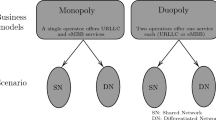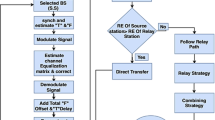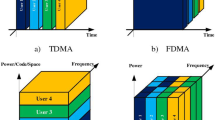Abstract
Multi-Code Direct-Sequence Code-Division-Multiple-Access (MC-CDMA) has been proposed as a flexible multiple access scheme for wireless packet networks that support a large variety of mobiles with different and even time-varying rates. Using MC-CDMA, traffic streams with significantly different transmission rates can be easily integrated into a unified architecture, with all the transmissions occupying the same bandwidth and having the same spread spectrum processing gain. In this paper, we address medium-access and interference issues in MC-CDMA wireless packet networks. For medium access, we propose and study Multi-Code CDMA (MC-CDMA) with Distributed-Queueing Request Update Multiple Access (DQRUMA) to form a unified bandwidth-on-demand fair-sharing platform for multi-rate wireless services. DQRUMA is an efficient demand-assignment multiple access protocol for wireless access and scheduling. Pseudo-Noise (PN) codes (primary codes) and optimal power levels are allocated to the mobiles on a slot-by-slot basis, and a Maximum Capacity Power Allocation (MCPA) criterion exploits the sub-code concatenation property of the MC-CDMA transmission. Simulation results show that the system provides close to ideal-access performance for multi-rate mobiles, both with homogeneous traffic characteristics and with a mix of heterogeneous traffic characteristics. Finally, we analyze the effects of MC-CDMA intercell interference on the reverse link (i.e., mobile to cell site) and investigate interference reduction by using the Maximum Capacity Power Allocation (MCPA) criterion. Our results show significant reduction in reverse-link MC-CDMA intercell interference is possible using the MCPA criterion.
Similar content being viewed by others
References
A.H. Aghvami, Future CDMA cellular mobile systems supporting multi-service operation,PIMRC'94/WCN Conference Record, The Hague, The Netherlands (IEEE and ICCC, 1994) pp. 1276–1279.
H. Azad and A.H. Aghvami, Multirate spread spectrum direct sequence CDMA techniques,IEE Colloq. on Spread Spectrum Techniques for Radio Communication Systems, Digest No. 1994/098 (IEE, 1994) pp. 4/1–4/5.
A. Baier, An open multi-rate radio interference based on DS-CDMA — The radio interference concept of CODIT,RACE Workshop'93, RACE Mobile Telecommunications Workshop (1993).
A. Baier, U.-C. Fiebig, W. Granzow, W. Koch, P. Teder and J. Thielecke, Design study for a CDMA-based third-generation mobile radio system, IEEE J. Select. Areas Commun. 12 (1994) 733–743.
Chih-Lin I and R.D. Gitlin, Multi-code CDMA wireless personal communications networks,ICC'95 Conference Record, Seattle, USA (IEEE, 1995) pp. 1060–1064.
M.J. Karol, Z. Liu and K.Y. Eng, Distributed-queueing request update multiple access (DQRUMA) for wireless packet (ATM) networks,ICC'95 Conference Record, Seattle, USA (IEEE, 1995) pp. 1224–1231.
C.B. Woodworth, M.J. Karol, Z.J. Haas and R.D. Gitlin, Spectrally efficient universal time slots using time-frequency-code slicing,WCN Conference Record, The Hague, The Netherlands (ICCC, 1994) pp. 1009–1013.
M.B. Pursley, Performance evaluation of phase coded spread multiple access communications — Part I: System analysis, IEEE Trans. Commun. 25 (1977) 795–799.
Author information
Authors and Affiliations
Rights and permissions
About this article
Cite this article
Liu, Z., Karol, M.J., El Zarki, M. et al. Channel access and interference issues in multi-code DS-CDMA wireless packet (ATM) networks. Wireless Netw 2, 173–193 (1996). https://doi.org/10.1007/BF01201052
Issue Date:
DOI: https://doi.org/10.1007/BF01201052




